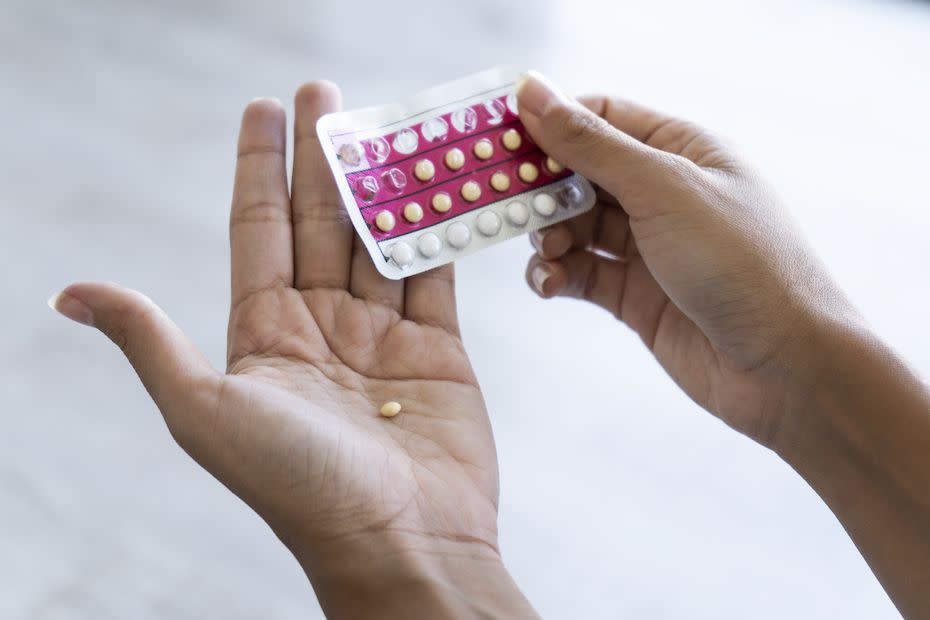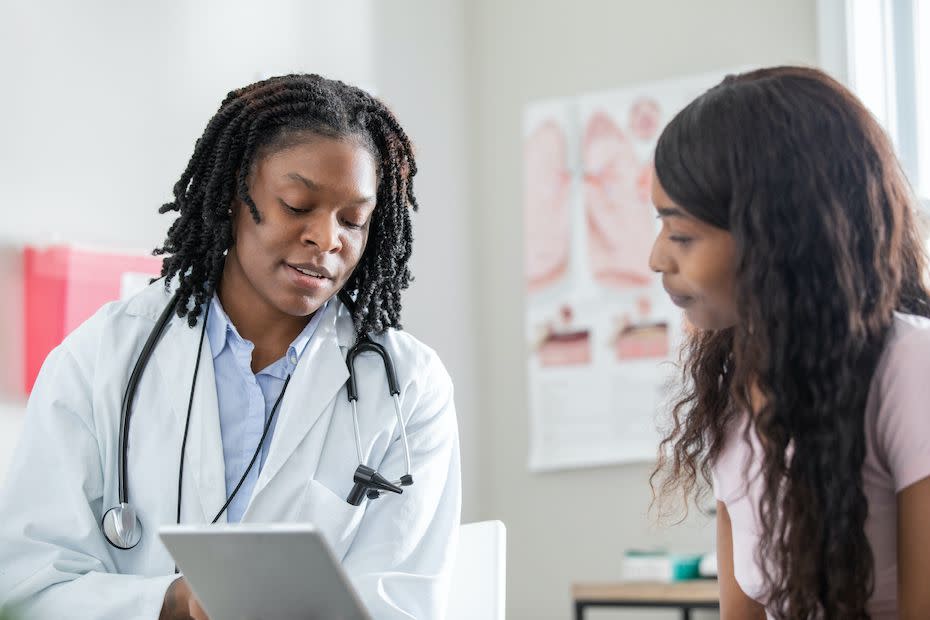What you need to know about the link between the pill and breast cancer

My bedtime scroll through Instagram last night was thrown into disarray when I happened upon an article claiming that the progestogen-only contraceptive pill – also known as the 'mini pill' – increases the risk of breast cancer by 20 to 30%. Almost instantly, the panic set in, and questions about whether I should stop taking the pill began racing through my mind. By the morning, I was ready to throw away the packets of the mini pill in my bedside table drawer, and I'm sure many others who also take this form of contraceptive found themselves in a similar position.
But, should we be as concerned as the headlines make out? Does taking the mini pill actually increase the risk of breast cancer by such a panic-inducing percentage? I spoke to three experts to find out more...
Breast cancer risk and the mini pill
Yesterday, a study published in the PLoS Medicine journal revealed that current or recent use of progesterone-only contraception (including the mini pill, IUD, implant or injection) increased a woman's chance of developing breast cancer within the next 15 years by 20 to 30%, depending on how old she was at the time she took it.
The study, carried out by researchers at Oxford University, looked at 30,000 patient records, and although this is only equivalent to 7% of the UK population, it still gives a good representation in regards to age, sex and ethnicity.

Although the finding's key takeaway that taking progesterone-only contraception increases the risk of developing breast cancer by 20 to 30%, the figure is not actually as scary as it sounds when we look at what this means in real life terms. Notably, this does not mean that 20 to 30% of women on the mini pill will get breast cancer as a result of taking it, but rather that hormonal contraceptive use might increase your already low chance of developing breast cancer by 20 to 30%, compared to the risk you started with.
To put that figure into perspective: for every 100,000 women on the pill in their late teens, researchers would expect only an extra eight to develop breast cancer; and for those in their late 30s, this rises to an extra 265. Of course, that's not to diminish the numbers altogether. Eight women is still eight women too many, and we hope that one day science will reach a point where that number is zero.
What do the experts say about these findings?
"We have known for some time that the combined oral contraceptive pill ('the pill') increases your risk of breast cancer slightly and this new study shows that there is an increased risk for progesterone only forms as well, which include the progesterone only pill (sometimes called the mini pill), the implant, injections and progesterone coil," explains Dr Philippa Kaye, author of Breasts.
"This increase is small, about the same as drinking 2 units of alcohol per week and has to be put in the context of the fact that breast cancer is commoner as you get older, with 8 out of 10 cases being in older women. Your risk as a younger woman is much smaller so even with a very slightly increased risk on hormonal contraception the overall risk is still small, and declines after you stop taking it."

"This research suggests there is a small increased risk of developing breast cancer for women while they are using, or soon after stopping, a newer progestogen-only contraceptive," adds Dr Kotryna Temcinaite, head of research communications at Breast Cancer Now. "The level of risk is around the same as for the older combined pill containing oestrogen and progestogen, which we’ve known about for some time. For both types of contraceptives, if you stop using them, this added risk of breast cancer reduces over time."
Dr Temcinaite also emphasises that the study didn't take into account the risks that those sampled already carried. "The study didn’t look at what hormonal contraceptives the women may have used in the past or consider how long they may have been on the progestogen-only contraception," she says. "It also didn’t factor in whether a family history of the disease contributed to their level of risk. So further work is needed to help us fully understand the impact of using this type of contraception."
Should I stop taking the pill?
Although there is a slight (emphasis on the slight) increase in the risk of developing breast cancer after taking hormonal contraception, there are also potential benefits. Research has shown that women who take hormonal contraceptives have a lower risk of womb and ovarian cancer, with that protection lasting for decades.
"There are lots of benefits of being on contraception – pregnancy itself has risks such as diabetes, high blood pressure, miscarriage, hyperemesis, preterm labour, DVTs and mental health issues and far more and contraception therefore protects against these," says Dr Kaye. "Contraception can also decrease your risk of womb and ovarian cancer. We also use contraception for the management of heavy periods, painful periods, PMS, PMDD, endometriosis and more so it has far wider health benefits as well."
The experts over at Cancer Research UK agree. "There are lots of possible benefits to using contraception, as well as other risks not related to cancer," says Claire Knight, senior health information manager at the charity. "That’s why deciding to take them is a personal choice and should be done after speaking to your doctor so you can make a decision that is right for you."
If stopping the pill isn't something you want – or are able – to do, Knight says there are plenty of ways you can reduce the risk of developing breast cancer. "For anyone looking to lower their cancer risk, not smoking, eating a healthy balanced diet, drinking less alcohol, and keeping a healthy weight will have the most impact," she notes.
Final thoughts
If you are concerned, it's important that you speak with your GP as well as continuing to check your body for any signs or symptoms that something may be wrong.
"If someone is concerned then please contact your GP, however the risk is still extremely small," Dr Kaye tells me. "Every medical decision is a balance between risk and benefit but if you have concerns please discuss with your doctor."

According to the NHS, the first symptom of breast cancer that most women notice is a lump or an area of thickened tissue in their breast, and you should see a GP if you notice any of the following:
a new lump or area of thickened tissue in either breast that was not there before
a change in the size or shape of one or both breasts
a discharge of fluid from either of your nipples
a lump or swelling in either of your armpits
a change in the look or feel of your skin, such as puckering or dimpling, a rash or redness
a rash (like eczema), crusting, scaly or itchy skin or redness on or around your nipple
a change in the appearance of your nipple, such as becoming sunken into your breast
Although we should all be wary of the risks associated with taking the contraceptive pill – and any medication for that matter – this study shouldn't spark too much panic, and Dr Temcinaite reassuringly reminds us that: "Breast cancer is rare in young women. A slight increase in risk during the time a woman uses a hormonal contraceptive means only a small number of extra cases of the disease are diagnosed."
This article is not intended to be a substitute for professional medical advice or diagnosis. Always seek the advice of your physician or other qualified health provider with any questions you may have regarding a medical condition.
Breasts by Dr Philippa Kaye, is out now (DK, £15).
You Might Also Like


